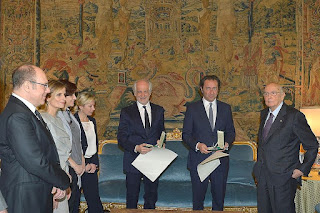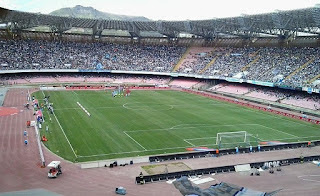Seventh Italian director to win Best Foreign Film at Oscars
.jpg) |
| Paolo Sorrentino won an Oscar for La grande bellezza in 2014 |
The award put him in the company of Federico Fellini and Vittorio De Sica in landing the Oscar for Best Foreign Film, a prize that has been won by only seven Italian directors in the history of the Academy Awards.
Fellini scooped the honour four times and De Sica twice. The other successful Italian directors are Elio Petri, Giuseppe Tornatore, Gabriele Salvatores and Roberto Benigni.
La grande bellezza - released for English-speaking audiences as The Great Beauty - was the first Italian winner since Benigni’s Life is Beautiful was named as Best Foreign Film in 1998.
Sorrentino’s 2021 semi-autobiographical movie The Hand of God - È stata la mano di Dio in Italian - was nominated for an Oscar but missed out to the Japanese drama Drive My Car.
Lauded for combining an expansive visual style with a sensitivity for psychological subtleties in his films, Sorrentino was born in the Arenella district of Naples, a relatively prosperous neighbourhood atop the Vomero hill.
His adolescence was overshadowed by a personal tragedy when he was 16, when both his parents died after a carbon monoxide leak at the ski lodge they owned in central Italy
 |
| Actor Toni Servillo in his role as Jep Gambardella in La grande bellezza |
Understandably, Sorrentino took a long time to come to terms with being orphaned. Eventually, he obtained a place studying economics and business at university in Naples, after which he chose a career in the film industry, making his debut as a screenwriter on Antonio Capuano’s 1998 comedy, The Dust of Naples.
His first full-length feature L'uomo in più - One Man Up - brought him immediate recognition as an emerging talent. The film was selected at the 2001 Venice Film Festival, gaining three nominations for the David di Donatello from the Academy of Italian Cinema and winning the Nastro d'Argento, awarded by Italian cinema journalists, Best First Time Director.
More awards followed for Le conseguenze dell'amore (2004), L'amico di famiglia (2006) and Il Divo (2008), his dramatised biopic of the controversial veteran politician, Giulio Andreotti.
Sorrentino’s talents also extend to writing: his 2010 novel Hanno tutti ragione - Everybody’s Right - was shortlisted for the Premio Strega, Italy’s most prestigious literary prize.
It was La grande bellezza that saw him join such illustrious names as Fellini and De Sica in the roll call of great Italian directors.
 |
| Sorrentino (second right) and the cast of La grande bellezza with president Giorgio Napolitano (right) |
On his 65th birthday, he learns that the woman who was his first sweetheart has died, having confessed to her husband that Gambardella had been the only man she truly loved. The shock causes him to take stock of his life, becoming melancholy about what he might have been had he done more than merely charm his way through an easy life of nightclubs, parties, and cafés. Ultimately, he finds a new appreciation for the timeless beauty of Rome and rediscovers himself.
In addition to the Oscar, La grande bellezza won 18 other awards around the world, including a BAFTA and a Golden Globe.
Although it missed out on the Oscar, The Hand of God, which takes its title from the famous description Maradona made of the contentious goal he scored with his fist against England in the 1986 World Cup, won the Grand Jury Prize at the Venice Film Festival.
The film contains many parallels with Sorrentino’s own life in that its central character is an adolescent whose life is rocked by personal tragedy, against the background of Naples in the 1980s, when the arrival of Maradona to play for SSC Napoli not only transformed the fortunes of the club but the city itself.
Travel tip:.jpg)
A mist-shrouded Vesuvius seen
from the top of Vomero hill
The Arenella district of Naples, where Sorrentino was born, borders Vomero, a largely residential area of central Naples with a number of buildings of historic significance. The most dominant, on top of Vomero Hill, is the large medieval fortress, Castel Sant'Elmo. In front of the fortress is the Certosa San Martino, the former Carthusian monastery, now a museum. The adjoining street, Largo San Martino, offers extraordinary views over the city towards Vesuvius. Vomero's other tourist attraction is the Villa Floridiana, once the home of Ferdinand I, the Bourbon King of the Two Sicilies. Surrounded by extensive gardens, the building now houses the Duke of Martina National Museum of Ceramics.
Travel tip:
Inside the Stadio Diego Armando Maradona in
Naples, which can house 60,000 spectators
The Stadio San Paolo - now renamed the Stadio Diego Armando Maradona - is Italy’s third largest football ground with a capacity of just over 60,000. Built in the Fuorigrotta neighbourhood on the north side of the city, it was completed in 1959, more than 10 years after work began and has since been renovated twice. The home of SSC Napoli, it was Maradona’s home stadium between 1984 and 1991, during which time the club won the Italian championship twice, having never before won the title in its history. The stadium hosted the 1990 World Cup semi-final, in which Maradona’s Argentina ended Italy’s hopes of reaching the final.
Also on this day:
1594: The death of painter Tintoretto
1914: The death of Angelo Moriondo, inventor of the espresso coffee machine
1921: The birth of Andrew Grima, jeweller to the British Royal Family
No comments:
Post a Comment